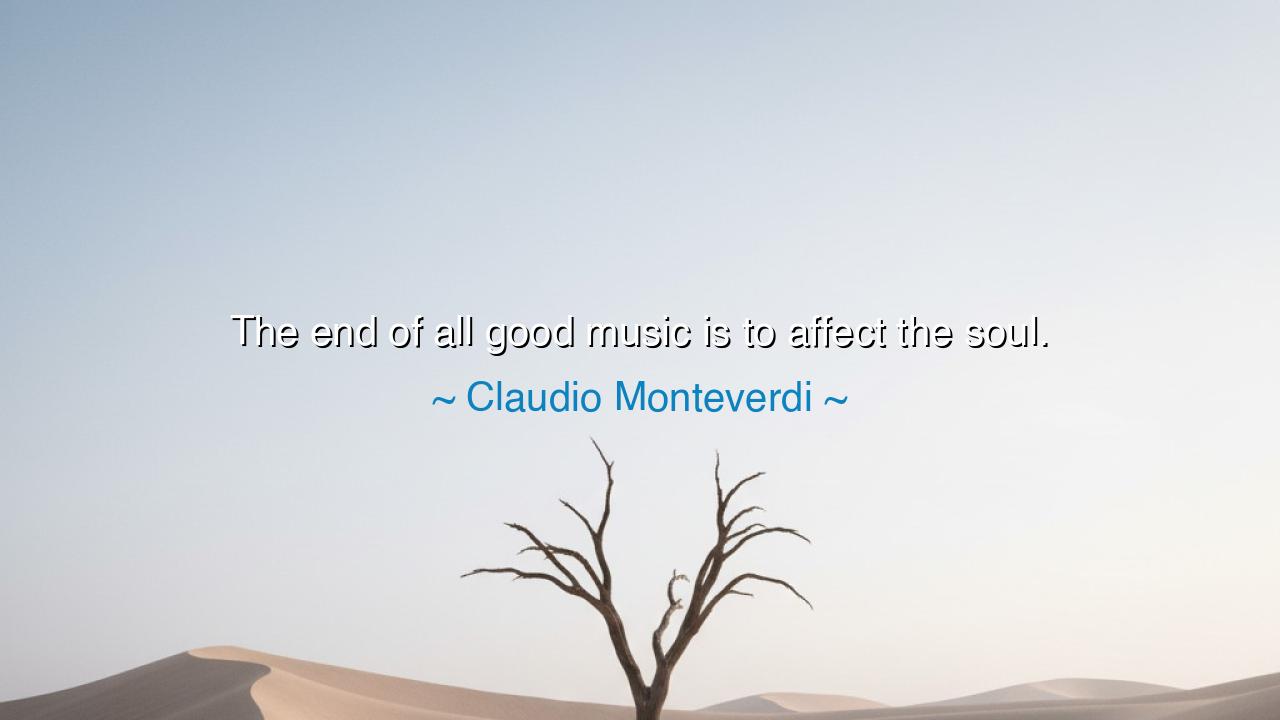
The end of all good music is to affect the soul.






Hear, O seeker of wisdom, the words of Claudio Monteverdi, the master of early song and opera, who declared: “The end of all good music is to affect the soul.” In this utterance lies a truth older than empires, deeper than oceans—that music is not for mere delight of the ear, nor for idle entertainment of the body, but for the awakening, stirring, and shaping of the soul itself. For what use is a melody that does not move the heart? What power is in a song that does not awaken tears, joy, longing, or strength?
When Monteverdi speaks of the end of music, he means its true purpose, its destiny, its highest aim. Just as the end of medicine is health, and the end of law is justice, so the end of music is to touch the invisible depths of human spirit. Notes, rhythms, and harmonies are but tools; the true work of music is to pierce the armor of the heart and call forth the soul’s response. Whether it be sorrow or gladness, stillness or ecstasy, music proves itself good only if it changes the listener within.
Monteverdi himself lived in an age of transition, when music moved from the complexity of the Renaissance to the passion of the Baroque. He believed that music must serve the text, that it must heighten emotion, that it must mirror the trembling of the human heart. He gave the world opera not merely as spectacle, but as living drama, where song became the very language of the soul. Thus, his declaration is born not of idle philosophy, but of practice—of shaping music into a force that could embody love, grief, and triumph with equal fire.
History confirms this truth. Consider the spirituals sung by enslaved peoples: songs like “Swing Low, Sweet Chariot” or “Wade in the Water.” These were not crafted for elegance alone, nor for technical perfection, but to strengthen the weary soul, to carry faith through chains, to give voice to hope in the midst of despair. Their power was not in the polish of sound, but in the fire they lit within the spirit of those who sang and those who listened. Here we see Monteverdi’s wisdom revealed across centuries: the greatness of music is measured by the soul’s transformation.
The same may be said of Beethoven, who, deaf and broken in body, yet composed symphonies that resound with triumph. His Ninth Symphony, crowned with the “Ode to Joy,” is not merely notes upon a staff—it is a shout of victory from one who had suffered deeply. Audiences rise when they hear it, not because the notes are flawless, but because the music reaches into their innermost being and lifts them into the realm of the eternal. Such is the soul-affecting power of true music.
Thus, O children of tomorrow, take this teaching: when you create, do not aim only for polish or applause. Ask instead: “Does this song move the heart? Does this word or work stir the soul?” For beauty that does not change the listener is like a flame without warmth. Whether you are musician, writer, or simply one who lives, let your deeds be like Monteverdi’s music: not empty sounds, but forces that shape the spirit of others.
Let your practice be this: listen with depth, not only with ears. When music stirs you, ask why, and carry that fire into your life. If you are a creator, do not chase perfection of technique alone, but seek to move the soul. If you are a listener, open yourself to be changed by the music you hear. For in this openness lies the secret gift of song—that it becomes not just sound, but transformation.
So remember always Monteverdi’s words: “The end of all good music is to affect the soul.” This is the crown of all melody, the purpose of every note, the destiny of sound itself. May your own life, like a song, affect the souls around you—bringing them light in sorrow, strength in weakness, and joy in the journey.






AAdministratorAdministrator
Welcome, honored guests. Please leave a comment, we will respond soon